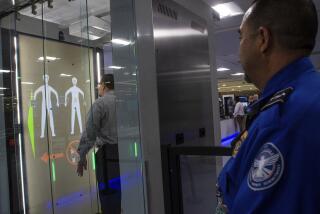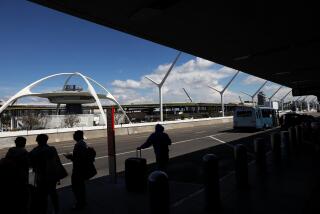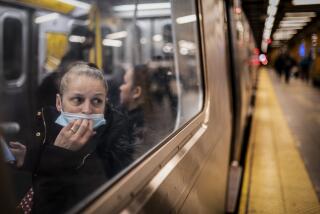TSA scanners pose negligible risk to passengers, new test shows
- Share via
Full-body scanners used for security screening at the nation’s airports do not expose passengers to dangerous levels of radiation, according to a new independent analysis of the security devices.
The study by the Marquette University College of Engineering concluded that radiation from so-called backscatter scanners passes beyond a passenger’s skin to reach 29 different organs — including the heart and brain. But the radiation levels are considerably lower than those of otherX-ray procedures such as mammograms, the study said.
The findings will be published in the next issue of Medical Physics, an international journal of medical physics research produced by the American Assn. of Physicists in Medicine.
The study, believed to be the first independent review of the scanners, is not likely to put to rest years of heated debate over the health risk of the machines operated by the Transportation Security Administration.
The TSA has submitted the scanners for testing by the National Institute of Occupational Safety and Health, the Johns Hopkins University Applied Physics Laboratory and the U.S. Army Public Health Command. The tests concluded that the scanners posed no significant risk to passengers, but TSA critics have called for more independent studies.
The author of the Marquette study, assistant professor of biomedical engineering Taly Gilat Schmidt, did not test the actual machines. Instead, she based her conclusions on scanner radiation data released publicly by the TSA. She ran the numbers through simulation software that modeled how X-ray photons travel through a body.
The study estimated that the scanners expose a passenger to less than a third of the maximum recommended dose of 0.25 micro sieverts, a standard established by the American National Standards Institute.
Gilat Schmidt said the results of her test suggest the risk to passengers is negligible even for children, frequent fliers and pilots.
“Even the risk analysis experts will tell you it’s negligible,” she said.
But Sen. Susan Collins (R-Maine), ranking member of the Senate Homeland Security and Governmental Affairs Committee, questioned the Marquette study because it was based on data provided by the TSA.
“We do not truly know the risk of this radiation exposure over multiple screenings, for frequent fliers, those in vulnerable groups, or TSA’s own employees operating the machines,” she said in a statement.
RELATED:
Amid criticism, TSA finds weapons at airportsHouse panel gives TSA advice on improving its image
TSA screeners allegedly let drug couriers through LAX for cash
More to Read
Inside the business of entertainment
The Wide Shot brings you news, analysis and insights on everything from streaming wars to production — and what it all means for the future.
You may occasionally receive promotional content from the Los Angeles Times.











